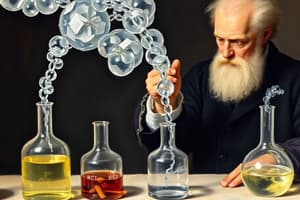Podcast
Questions and Answers
According to Democritus's atomic theory, what are all things composed of?
According to Democritus's atomic theory, what are all things composed of?
- Invisible particles of impure matter
- Minute, invisible particles of impure matter
- Indestructible particles of impure matter
- Minute, indestructible particles of pure matter (correct)
In what year was the first book of chemistry written?
In what year was the first book of chemistry written?
- 300 BC (correct)
- 400 BC
- 1597 AD
- 384-322 BC
What were the four fundamental properties proposed by Aristotle?
What were the four fundamental properties proposed by Aristotle?
- Hot, cold, dry, and hard
- Hot, cold, wet, and hard
- Hot, cold, dry, and wet (correct)
- Hot, soft, dry, and wet
Who is the Celsius scale named after?
Who is the Celsius scale named after?
Which scientist's name is associated with the Kelvin scale?
Which scientist's name is associated with the Kelvin scale?
Who devised the Rankine scale?
Who devised the Rankine scale?
Who is often credited with the discovery of oxygen, despite the fact that it was probably discovered by someone else earlier?
Who is often credited with the discovery of oxygen, despite the fact that it was probably discovered by someone else earlier?
In which city is the John B. Lacson Foundation Maritime University located?
In which city is the John B. Lacson Foundation Maritime University located?
Which scientist was the first to work with gases and discovered the relationship between the volume and pressure of a gas?
Which scientist was the first to work with gases and discovered the relationship between the volume and pressure of a gas?
Who used others' results to propose many theories and did very careful quantitative experiments to verify the works of others?
Who used others' results to propose many theories and did very careful quantitative experiments to verify the works of others?
Flashcards are hidden until you start studying
Study Notes
Democritus's Atomic Theory
- Proposes that all things are composed of small, indivisible particles called atoms.
First Book of Chemistry
- The first book of chemistry was written in 1661.
Aristotle's Four Fundamental Properties
- Proposed four fundamental properties: hot, cold, wet, and dry.
Celsius Scale
- The Celsius scale is named after Anders Celsius, a Swedish astronomer.
Kelvin Scale
- The Kelvin scale is associated with the scientist William Thomson, also known as Lord Kelvin.
Rankine Scale
- The Rankine scale was devised by engineer and physicist William John Macquorn Rankine.
Discovery of Oxygen
- Joseph Priestley is often credited with the discovery of oxygen, despite earlier discoveries by others.
John B. Lacson Foundation Maritime University
- Located in Bacolod City, Philippines.
Gas Laws Pioneer
- Robert Boyle was the first to work with gases and discovered the inverse relationship between the volume and pressure of a gas, now known as Boyle’s Law.
Cautious Scientist
- Antoine Lavoisier used others' results to propose many theories and performed meticulous quantitative experiments to confirm the work of predecessors.
Studying That Suits You
Use AI to generate personalized quizzes and flashcards to suit your learning preferences.




